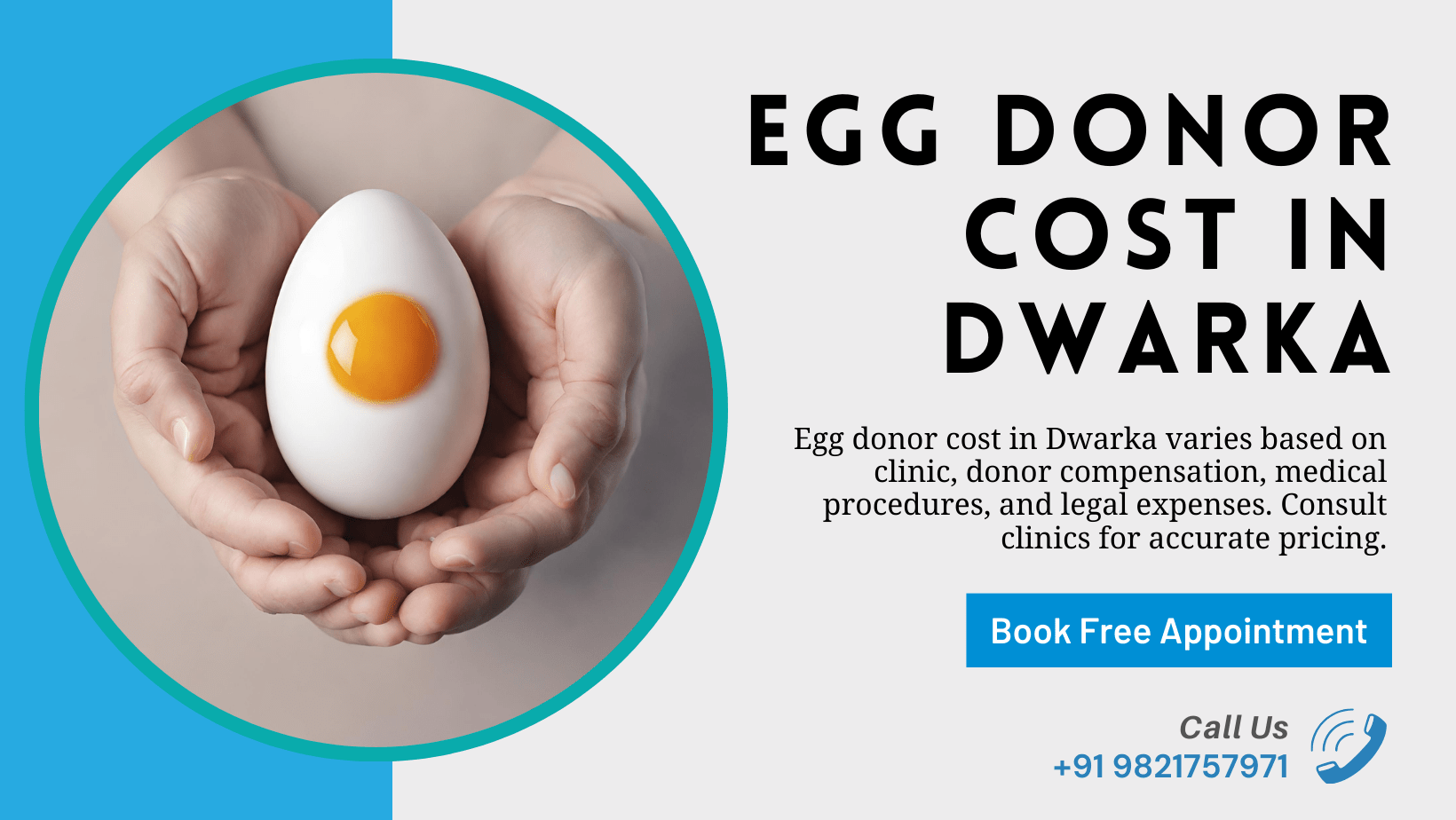Embarking on the journey of egg donation in Dwarka, Delhi involves careful consideration of various factors, including the cost. Understanding the intricacies of egg donor cost in Dwarka is crucial for individuals or couples seeking fertility treatments in this bustling area.
Dwarka, known for its modern amenities and medical facilities, offers a range of options for those exploring egg donation as a pathway to parenthood. From clinic fees to donor compensation and ancillary expenses, the cost of egg donation in Dwarka encompasses multiple components that require thorough understanding and planning.
This informative introduction aims to shed light on the various aspects of egg donor cost in Dwarka, providing valuable insights for individuals navigating the complexities of fertility treatments in this vibrant part of Delhi.
Exploring the Concept of Egg Donation
- Definition and Purpose: Egg donation involves the generous act of a woman (the donor) providing her eggs to another individual or couple (the recipients) for the purpose of fertility treatment.
- Importance of Egg Donation: For individuals or couples struggling with infertility, egg donation opens doors to parenthood, offering hope and a chance to build a family.
- Legal and Ethical Considerations: In India, egg donation is regulated by guidelines ensuring the safety and rights of all parties involved. Understanding these regulations is essential for informed decision-making.
Factors Influencing Egg Donor Cost
Clinic Fees: The cost of egg donation in Dwarka varies depending on the fertility clinic chosen. Factors such as reputation, success rates, and amenities offered can impact clinic fees.
Donor Compensation: Egg donors receive compensation for their time, effort, and the physical demands of the donation process. This compensation varies based on factors like donor experience, demand, and local regulations.
Medical Expenses: Comprehensive medical screening, including tests for genetic and infectious diseases, is conducted on egg donors. Recipients typically cover these expenses as part of the overall cost.
Additional Costs: Other expenses may include legal fees, counseling services, and medication for both the donor and recipient.
Egg Donor Cost in Dwarka
Navigating the realm of Egg Donor Cost in Dwarka involves considering various factors that contribute to the overall expenses. On average, the cost of egg donation in Dwarka, India, ranges from INR 70,000 to INR 1,50,000, depending on clinic fees, donor compensation, medical tests, and legal expenses. It’s essential to consult with reputable fertility centers like ours to understand the breakdown of costs and the quality of services offered. By gaining insight into the financial aspects of egg donation, prospective parents can make informed decisions and embark on their journey to parenthood with confidence and clarity.
Understanding Egg Donor Cost Breakdown
- Clinic Fees: These encompass consultation fees, diagnostic tests, and administrative charges associated with the egg donation process. Clinics may offer package deals or financing options to alleviate financial burdens.
- Donor Compensation: Donors are compensated for their time, travel, and discomfort during the donation process. Compensation may vary but is typically standardized within the clinic.
- Medical Expenses: This includes the cost of fertility medications, hormone injections, and the medical procedures involved in egg retrieval and transfer.
- Legal and Administrative Fees: Legal contracts outlining the rights and responsibilities of all parties involved incur additional costs. These fees ensure clarity and protection for both donors and recipients.
What is the Success rate of IVF with egg donation?
When assessing the success rates of fertility treatments, particularly in the context of egg donation, it’s crucial to focus on the ultimate goal: achieving live births. While many discussions surrounding success rates center on pregnancy rates, it’s important to emphasize that the true measure of success lies in the birth of a healthy baby.
For younger women with no underlying fertility issues, the success rates of conceiving through their own eggs can be comparable to, or even higher than, those achieved through egg donation. However, for older women or younger women with diminished ovarian reserve, egg donation often presents a more promising path to success. This is because donor eggs are typically sourced from young, healthy individuals with optimal ovarian function.
In the realm of egg donation, the primary technique employed is in vitro fertilization (IVF), which may involve either conventional IVF or a more advanced approach known as intracytoplasmic sperm injection (ICSI). Through IVF, the donor eggs are fertilized with the intended father’s sperm in a laboratory setting before being transferred to the recipient’s uterus.
By opting for egg donation and undergoing IVF, individuals or couples facing fertility challenges can significantly enhance their chances of achieving a successful pregnancy and ultimately welcoming a healthy baby into their lives.
Success Rates Based on Patient Age
The success rates for IVF cycles using a patient’s own eggs typically range from 35-43%. However, with egg donation, the success rates per IVF cycle can soar to approximately 55-63%. These variations in success rates are attributed to the receptivity of the uterus, which tends to decline with advancing age.
Research indicates that implantation and pregnancy rates decline significantly in women aged 45-50, while the risk of miscarriage increases notably after the age of 45. Despite these challenges, the success rates for donor egg IVF remain promising.
On average, the success rates (pregnancy rates) for donor egg IVF are approximately 69% for patients under 45 years old. Even for recipients aged 45-50, the success rates remain substantial at around 63%.
Furthermore, studies have shown that transferring a blastocyst on Day 5, as opposed to an embryo on Day 3, results in higher pregnancy rates for donor egg IVF cycles.
We provide the following birth rates based on the transfer of fresh embryos on Day 5, categorized by the age of the recipient:
- Under 35: 69%
- Between 35 and 37 years: 52.7%
- Between 38 and 40 years: 52%
- Between 41 and 42 years: 37%
Additionally, the likelihood of success increases with each IVF attempt using egg donation. In general, most women achieve pregnancy within three to four IVF-Egg donation cycles.
Conclusion
In conclusion, understanding the complexities of egg donor cost in Dwarka is vital for individuals and couples embarking on the journey of assisted reproduction. At Baby Grow Fertility, we prioritize transparency and support, guiding our patients through every step of the process with compassion and expertise. By empowering our clients with knowledge and resources, we aim to make the path to parenthood through egg donation a fulfilling and rewarding experience. Whether you’re considering becoming an egg donor or seeking donor eggs, our dedicated team is here to provide the guidance and support you need to achieve your dream of building a family.
Frequently Asked Questions:-
Q1. What is the pregnancy rate of egg donors?
Ans: While the average pregnancy rate achieved for an IVF cycle with the patient’s eggs is around 35-43%, the rate can increase to approximately 55-63% success per IVF cycle with egg donation.
Q2. Is a donor egg still your baby?
Ans: Unfortunately, donated eggs from an egg bank won’t include any genetic material from you, but the child could still possess some of your personality or physical features.
Q3. Is it safe to use donor eggs?
Ans: Egg donation carries the same risks as in vitro fertilization and embryo transfer and there is a 20-25% chance that the pregnancy will involve multiples. Pregnancies from donor eggs carry the same 3-5% risk of birth defect as natural pregnancy. The medications involved may have side-effects.




